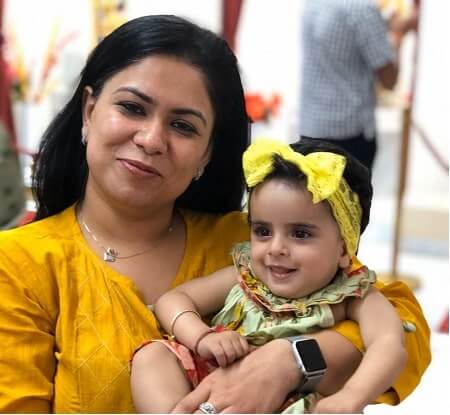For as long as I can remember, I have wanted a daughter. A daughter who would talk non-stop, sing with me, dance with me, who I would doll up in pretty frocks, and who would
someday share shoes and dresses with me.
When she arrived, I named her Arika. It is one of the names of Goddess Lakshmi. (Lakshmi ghar aayi hai, it is said in our culture when a daughter is born, the goddess has come to your home.)
Also, with her older brother named Atharv, one of the names for the god Ganesh, we had our own Lakshmi-Ganesh duo at home to complete our little world. She didn’t cry much, smiled a lot, and I thought we were blessed to have a no-fuss baby. She did not sleep well though, and had a bit of reflux, but I dismissed these as minor issues.
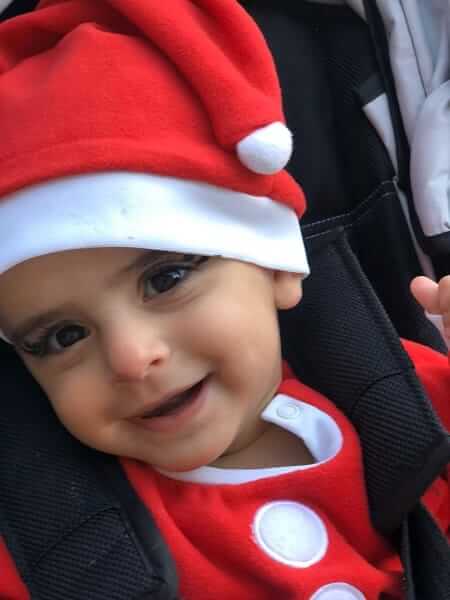
My husband Mohan and I could not have been happier. Until one fateful trip to the doctor’s turned that dream into a nightmare.
At five months of age, she had yet to hold her head up and that was when I decided to bring her to a Maternal and Child Health nurse. I hoped she would dismiss it, saying I was just another over-cautious mother. How wrong I was.
Instead, we were referred to the children’s hospital, from where began our journey no parent wishes to be on. Three months of cranial ultrasound, countless blood tests, gruelling paediatrician visits and a genetic test determined that Arika had a rare neuro-genetic disorder, Angelman Syndrome (AS).
Named after the UK doctor Harry Angelman who first reported the condition, AS has devastating effects such as global developmental delays, feeding and sleep difficulties, movement and balance deficiencies, lack of functional speech, severe cognitive impairment and seizures that are difficult to treat.
Typically, AS children have an excitable demeanour, are always laughing and smiling, have short attention spans and, interestingly, a common interest in water. They also need less
sleep than usual.
People living with the syndrome require 24/7 life-long care, intensive therapy and close medical supervision.
We were baffled. We had done every in-utero genetic test there was, yet nothing had come up. Now here we sat with the news that our beautiful baby was an “angel”.
Arika is severely delayed in her motor skills. At 15 months of age, she still does not respond to her name or sit unsupported. She only weighs 6.5kg and has no speech.
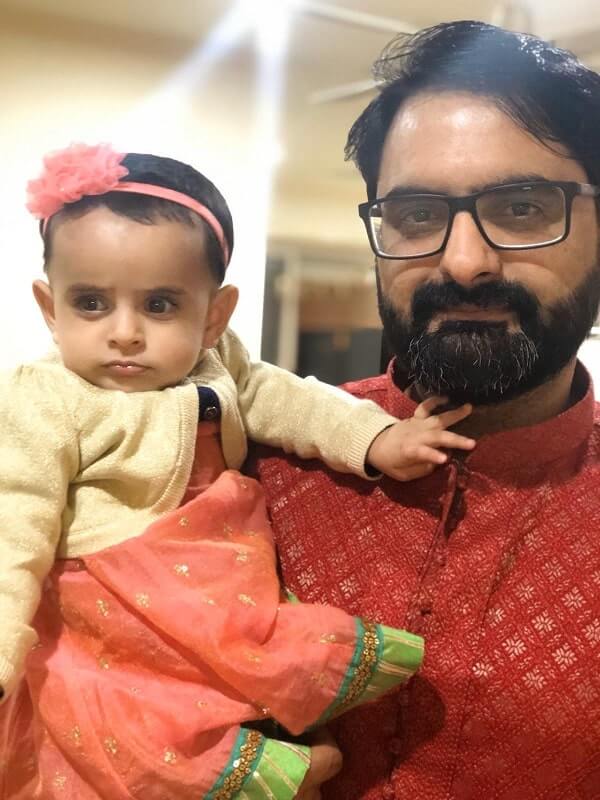
‘Mumma, when will Arika walk?’
To say the least, we were traumatised. It took away from us as parents the healthy and happy future we envisioned for our family. It took away from our son a chance to build and live an amazing childhood with his sister. Worst of all, it took Arika away from a chance at a normal, full life.
I went into a shell, isolating myself as I tried and failed to see the good beyond this fate. I cried every day for months at the thought of never hearing Arika’s voice. I was inconsolable.
Each day, I lived in fear that the seizures might take my daughter away for me, forever. I would have done anything to have the “normal” problems of parenting like a fussy eating
infant, toddler tantrums, terrible twos, or teenage dramas!
Dark questions loomed. Who will take care of Arika when Mohan and I are no longer around? Will the onus of a disabled sibling fall on my son’s shoulders and ruin his dreams and aspirations?
The simplest encounters beyond my family saw me dissolve in a mess of tears: a little girl screaming in the mall; a disabled person in a wheelchair, a mother and daughter shopping. Even the beautiful dresses I bought for Arika before she was born, hoping she would start strutting in them on her first birthday.
Every now and then, Atharv would ask me, ‘Mumma, when will Arika walk? Mumma, did you hear Arika say Bhaiya?’ I could never find the words to respond. He looks forward to his sister walking, talking and playing with him, just like all his friends’ sisters. We decided to go to India in the tough time, which helped.
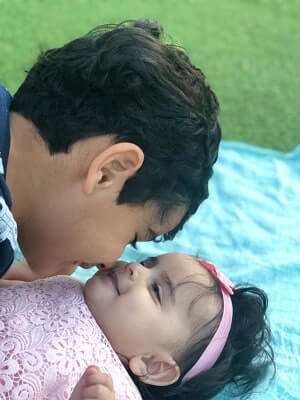
Being around family helped a lot. They allowed me to cry my heart out so I could move forward. Soon I felt as though it was time to gather myself.
My son needed me. He was starting school and could not understand why Mumma was crying all the time. Lost with how to explain the heartbreaking news to him, we just told him that Mum wasn’t well. And the sweetheart he is, Atharv would come up to me, hug me and say, ‘Mumma don’t cry, you will get well soon.’
Arika needed me too, more than ever, more than anyone.
As for Mohan, much as he was breaking on the inside, he remained the rock of the family. Shortly after the diagnosis, he went into problem solving mode, so typical of him. He started exploring options, therapeutics, therapies and speaking with community members to find anything we could do for our little girl. From researching Ayurvedic medicines to diets to medications recommended by other AS parents, he made sure he was all over it. He pushed me to resume “normal” activities like meeting up with friends and going back to work. I had doubts about scheduling and being present for all her therapies.
But he was persistent.
Once back in Australia, we started Arika’s therapies. She needed physiotherapy, speech and occupational therapy. Additionally, AS patients need behavioural and music therapy.
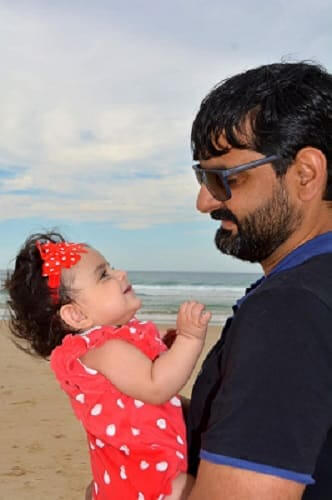
Finally hope came in the form of science
It has been eight months since the diagnosis and I still cry every day, this time with a reason to hope. While I have come to accept that I will never completely make peace with the situation, hope came to us in December 2019 in the form of the Foundation for Angelman Syndrome Therapeutics (FAST), an AS community of families and medical specialists.
They announced at their annual gala in the US that not one, but three pharmaceuticals companies are taking gene therapy to human trials in 2020.
Hollywood actor Colin Farrell, who has a son with this condition, has been actively involved with FAST raising awareness and funds to help facilitate research and support families.
In Australia FAST is working to make the organisation more visible and bring the clinical trials here. The only issue is, the organisation needs more “angels” to be registered for trials.
For donations to be directed to FAST AU, direct it to – https://personalchallenge.gofundraise.com.au/page/ArikaAspires
Because AS is so rare, it can go undiagnosed or be incorrectly diagnosed. In Australia, it is suspected that this may be the case with as many as two thirds of individuals. For FAST to advocate for trials in Australia, we need to find where these families are and connect with them,; we need them to be counted. FAST needs to build a strong network of professionals willing to run these trials for us and to do that we need more money. There is so much hope for a brighter future for all our families that they might not even be aware of yet!
So, this International Angelman Syndrome Day on 15 February, Mohan and I are on a quest to find the others, to help raise the funds needed for these trials.
Help us fight the fight, a chance for a better future for our daughter, and all her special friends suffering from AS.
People have taken to calling me “strong”, and commend me for “handling this situation so well.” Little do they know that these words are like a dagger to my heart. I am not strong. I did not want to be strong or live through this pain each day. But I do not have a choice. I brought this baby girl into this world; how can I let her down?
Angelman Sydnrome: Symptoms
- Delayed Development
- Intellectual Disability
- Severe Speech Impairment
- Ataxia
- Epilepsy
- Microcephaly
- Excitable demeanour/ hand flapping
- Sleep difficulty
- Short attention span
Source: cureangelman.org.au
Interesting characteristics of Angelman Syndrome (AS)
An interest in water and shiny reflective objects This commonly prevalent characteristic is thought to be related to their sensory seeking behavior, where they are driven by a preference for certain stimuli.
Happy, excitable personality Teeming with smiles and laughter, it is hard to tell whether an “angel” really does feel what they portray. This is because of their restrictions in expression or reduced insight. Nevertheless, research reported that most AS individuals have an “excessive positive effect” with, believe it or not, no negative emotion according to Further Information Neurogenic Disorders (FIND). Of course, while the latter can vary, reports also show that no changes are shown in the mood with age.
International Angelman Day (IAD)
IAD is observed on 15 February to raise awareness worldwide for Angelman Syndrome. It helps to
Mobilise people to action, to encourage fundraising
Promote research and organisational resources
Remember the Angels we have lost along the way
KIK-AS #CureAngelmanNow #CAN2020
Together we have a stronger voice.
Source: cureangelman.org.au



